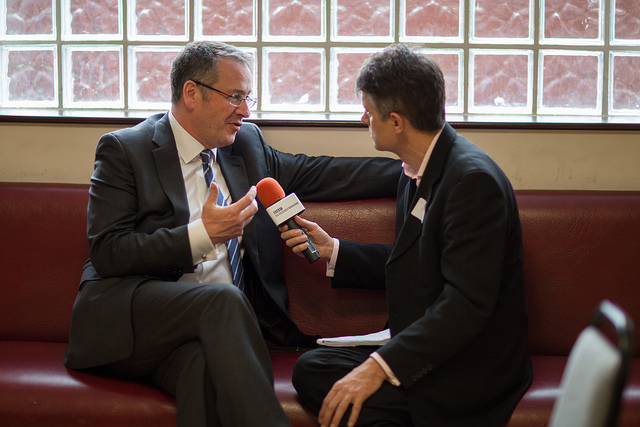Research from Belgium shows that partisan, rather than policy goals lead to MPs’ media responsiveness
Media coverage influences the parliamentary agenda. Research in many different European countries has shown that MPs ask parliamentary questions or initiate debate about the news of the day. Julie Sevenans, Stefaan Walgrave and Debby Vos examine why they do so, by investigating whether Belgian politicians’ media responsiveness is influenced by their political goals. They find that media responsiveness is mainly a function of partisan goals. Politicians use the typically negative and conflict-rich media coverage to attack their opponents rather than to nurture substantial policy-making.

Credit: reway2007, CC BY NC SA 2.0
According to their own saying, almost a quarter of Belgian MPs’ initiatives in parliament is inspired by preceding news media coverage. Other European countries—such as the UK—generally score somewhat lower in this respect, but with a European average of 16% (as pointed out by an earlier study by Midtbø and colleagues), the proportion of initiatives inspired by media coverage is substantial.
How to interpret these figures? Should we be worried about the media having too much power over policy-making processes? Or, is it politicians who deliberately use media information for rhetoric purposes only? A study conducted at the University of Antwerp attempts to answer these questions by investigating what type of politicians are most reactive to the media. Drawing on a survey with Belgian national MPs, they show that the partisan rather than the policy-making aspects of politics are sensitive to agenda influences from the mass media.
MPs from opposition parties are found to be more responsive to the media than MPs from government parties. About a quarter (26%) of opposition MPs’ initiatives is inspired by the media, whereas 19% of coalition MPs’ initiatives are. The reason is that media coverage is more useful for the former than for the latter. The typical characteristics of media coverage—media reports are often general, negative, conflict-rich and focused on the political game—make it particularly useful for opposition MPs. Their role in parliament is to control the government, often via interpellations and parliamentary questions. News coverage gives them the necessary ammunition to attack the government. Coalition parties—who are mainly responsible for policy making—also engage in partisan strife, but they must be more careful as attacking other politicians, especially those from the other government parties, could threaten the stability of the coalition. Accordingly, they often avoid negative, conflict-rich media cues.
On the individual level, a similar logic applies. MPs who are focused on partisan goals such as attacking their political opponents—we would like to call these politicians ‘party warriors’—are more responsive to the media than MPs who are not. Concretely, MPs who play the attack-and-defense game and are eager to confront political rivals with their incompetence, base 31% of their initiatives on media coverage, which is a lot more than MPs who do not care about the partisan game, and base 17% of their initiatives on media coverage. Again, the usefulness of media coverage is higher for the former type of politician than for the latter. This individual effect exists on top of the party level differences between coalition and opposition.
In conclusion, media responsiveness is a function of the degree to which an MP deals with party politics. Policy making goals, in contrast, appear not to be related to media responsiveness. This has implications for our assessment of role of the mass media in politics. The findings are good news for those who think media influence on policy-making is undesirable because policy decisions need to be based on a long-term vision rather than on the news of the day. Added to that, the media responsiveness of the party warriors ensures that the topics politicians care about are reflecting what happens in society. It is the party warriors who generate political responsiveness vis-à-vis media, and to some extent societal, priorities.
—
For more information on this topic, see the authors’ recent article in Research & Politics. This post represents the views of the authors, and not those of Democratic Audit or the LSE. Please read our comments policy before posting.
Julie Sevenans is PhD student in Political Communication at the University of Antwerp. Her research focuses on the relationship between media and politics, and in particular on agenda-setting effects of the media on politics.
Stefaan Walgrave is Professor of Political Science at the University of Antwerp. He works on media & politics, protest and social movements, and on elections.
Debby Vos is PhD student in Political Communication at the University of Antwerp. Her research focuses on the determinants of news coverage of individual politicians.





 Democratic Audit's core funding is provided by the Joseph Rowntree Charitable Trust. Additional funding is provided by the London School of Economics.
Democratic Audit's core funding is provided by the Joseph Rowntree Charitable Trust. Additional funding is provided by the London School of Economics.
Our new research suggests that media responsiveness is a direct function of partisan goals, as opposed to policy ones https://t.co/J93mFwGwk6
Research from Belgium shows that partisan, rather than policy goals lead to … – Democratic Audit UK https://t.co/0iLf4j3IWF #Belgium #News
Research from Belgium shows that partisan, rather than policy goals lead to MPs’ media responsiveness https://t.co/av4wt9kyCc
Research from Belgium shows that partisan, rather than policy goals lead to MPs’ media responsiveness: Media c… https://t.co/q99kSOpFwB
Belgian research shows MPs media appearances attack opponents more than
build public support for own policy goals https://t.co/AlS9r6005M
Research from Belgium shows that partisan, rather than policy goals lead to MPs’ media responsiveness https://t.co/AkOxablyZC #Option2Spoil
Research from Belgium shows that partisan, rather than policy goals lead to MPs’… https://t.co/906kpOq00f https://t.co/BKi8XgPxZr